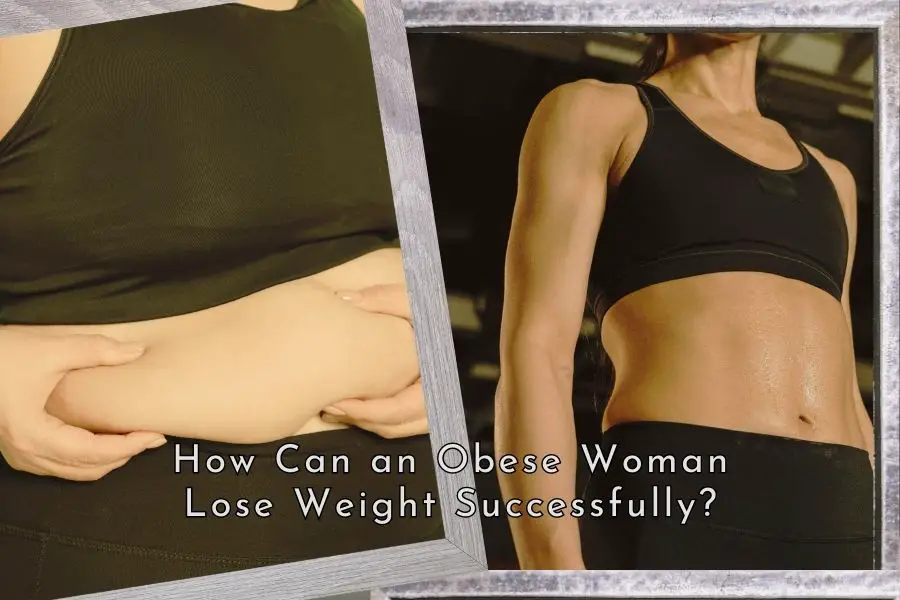Losing weight is a challenging journey, but with the right strategies, obese women can achieve their weight loss goals and maintain their progress. In this comprehensive article, we delve into research-based approaches in the areas of diet, exercise, and mental health to help you lose weight effectively. Join us as we explore practical strategies to avoid weight regain and pave the way for long-term success.
1. Obese women need to adopt a diet low in carbs, high in protein, and low to moderate fat to lose weight
To effectively eliminate excess body fat, it is essential to train your body to rely on fat as its primary source of fuel.
To train your body to burn fat, you will need to switch from a high-carb diet to a very low-carb and high-fat diet.
In the absence of carbohydrates, your body will have to learn to burn fat for fuel. And when fat from dietary sources is insufficient to meet your body’s functioning needs, your body will switch to burning the fat reserve on your belly, your thighs, and your arms.
Two highly recommended diets for weight loss in obese individuals, in our view, are the carnivore diet and the ketogenic diet as they are both low in carbohydrates and facilitate fat burning. If you’re unsure which diet to choose, consider reviewing our comprehensive comparison of the two.
In addition to tightly controlling your carbohydrate intake, a high-protein and low-carb diet will help you lose weight faster and more successfully. This is because protein is highly satiating and low in calories. Protein also has the effect of suppressing the hunger hormone and making you feel full for longer. [1, 2, 3, 4, 5, 6]
When you are trying to lose weight, you want to lose the fat reserve rather than muscle mass and so a high protein intake is also necessary in order to maintain or increase muscle mass.
As to fat intake, because you have already limited your carbohydrate intake, you will need some fat in your diet for fuel.
If you manage to keep your fat intake at low to moderate levels, you will lose weight faster because this will force your body to burn the fat reserve for fuel instead of using fat from dietary sources.
To sum it up, adopting a diet that is low in carbohydrates, high in protein, and low to moderate in fat can facilitate rapid weight loss for obese individuals. Consistency in following this diet in the long run will help you not only shed excess weight but also prevent weight regain, leading to sustained success in your weight loss journey.
2. Obese women should incorporate intermittent fasting
Intermittent fasting or prolonged fasting can help obese women lose weight faster and more effectively than calorie restriction.
Intermittent fasting means there is a period of fasting between feeding times.
In this sense, everybody does intermittent fasting to some extent.
However, in order for intermittent fasting to have any material impact on your waistline, you need to substantially increase the fasting period, i.e. making the gaps between meals longer.
When food stops coming in, your body will first resort to the glycogen stored in the liver to function.
When the glycogen is depleted, your body will begin to burn the reserved fat for fuel.
The longer you abstain from food, the more your body has to rely on the reserved fat to function.
As we are all doing intermittent fasting already, if you want it to help you with your weight loss goals, all you have to do is gradually increase the time gap between meals.
If you have been eating six meals a day, reduce it to 3 meals a day, for example. Munching all day will keep your blood sugar high and maintain insulin spikes which will promote fat storage.
After you have reduced the number of meals to 2-3 times a day with no snacks in between, reduce your feeding window by keeping those meals to a 6 to 8-hour period. Your body will have 16 to 18 hours of no food intake and have the chance to burn stored glycogen as well as stored fat.
Intermittent fasting may seem like a radical concept in today’s time, but it’s worth noting that not long ago, Ancient Romans typically had just one substantial meal per day. This meal was usually consumed around 16:00, and the belief at that time was that eating more than once a day was considered unhealthy and a form of gluttony. [7]
My single best weight loss tip is don’t eat all the time.
Dr Jason Fung
The next step after intermittent fasting is to prolong a fast for 2 to 3 days or more.
With zero calories coming in for a few days, your body will be burning a lot of fat for fuel, no doubt about it. A good thing about fasting is your metabolism won’t slow down unless your fasting period is extremely long.
This is an advantage of fasting over calorie restriction where your body’s basal metabolism rate will slow down once it senses calorie restriction is an ongoing fact of life. [8]
Completing a long fast is not difficult if you have already been following a low-carb diet because your body is well adapted to using fat as fuel. When you are on an extended fast, the body will naturally switch to using stored fat rather than fat from dietary sources for energy.
Extended fasting is generally considered safe. Buchinger Wilhelmi, a fasting clinic based in Germany, has been offering therapeutic fasting programs for over 100 years. Their current fasting programs last from 3 days to 28 days with options to extend. In 1965, a Scottish man even fasted for 382 days and shed 276 pounds (125 kg). During the fast, he consumed only non-caloric fluids but took supplements and electrolytes. [9]
If you wish to occasionally embark on an extended fast that exceeds 24 hours to accelerate weight loss and experience other health benefits, it is important to consult with your doctor to ensure it is safe for you. Although generally safe, there have been cases of individuals who have died due to long, unsupervised fasts. [10, 11, 12]
3. Obese women should stick to water only to support weight loss
For some obese people, simply cutting out all sugary drinks makes a significant difference to the number on the scale. This is because sugary drinks can be very high in empty calories and it’s so easy to drink those liquid calories and pile up on the pounds without knowing.
When you want to lose weight, the best drink is water.
Water is essential for life and contains no calories. Approximately 60% of the adult human body is composed of water, making it a major component of most body parts. It is crucial for brain function, hormone production, oxygen delivery, cell growth, and numerous other physiological processes. Water also lubricates joints, aids in waste removal, regulates body temperature, and performs many other functions. [13]
There is some evidence suggesting that water can support weight loss by: [14]
- Lowering appetite
- Boosting metabolic rate
- Improving decision-making in relation to better food choices and reducing stress
- Supporting fat burning.
In addition to water, there are other drinks that can provide variety while aiding weight loss efforts. These include bone broth, protein shakes, lemon water, fruit-infused water, and herbal teas. These beverages are either low in carbohydrates and calories or high in protein, both of which can support weight loss.
4. Obese women need to substantially increase exercise volume to help with weight loss
Your body expends the majority of its energy (50% to 80%) on vital functions that keep you alive, such as breathing, maintaining a heartbeat, circulating blood, cell growth and repair, and hormone regulation. [15]
The remaining energy is allocated to digesting food (5% to 10%) and fueling physical activities (20%).
Because general physical activities and exercises don’t burn as many calories as people often think, in order for exercises to have any significant positive impact on achieving your weight loss goals, you will need to increase exercise volume substantially.
There are a number of ways to accomplish this.
I have previously written in detail about the most effective exercises for weight loss in obese individuals.
In summary, if you are obese, you can increase the volume of your exercises or physical movements by:
- Standing up: Spending an additional three hours standing per day can burn up to 30,000 extra calories and result in an 8-pound fat loss over a year. For an obese person, simply being on your feet for a longer period of time during the day can make a significant difference [16]
- Walking. Walking is another exercise that people of different fitness levels can do safely anytime, anywhere
- Yoga. Yoga can increase your calorie expenditure and improve your fitness, flexibility, and mental health
- Stationary bike riding. This low-impact exercise can burn a substantial number of calories, particularly if you incorporate high-intensity intervals as your fitness level improves
- Resistance training. Engaging in resistance training to enhance muscle mass can facilitate weight loss. Note that men often have a higher capacity for building muscle mass and may experience more significant gains in strength and muscle growth but women can also build strength and increase muscle mass through resistance training
- Water exercises. These gentle exercises are easy on the joints, increase calorie expenditure, and offer additional health benefits.
If you haven’t already, I highly recommend checking out my previous post on the best exercises for obese individuals. It provides more detailed information about these exercises and offers tips on how to start them gradually and safely.
In addition to finding ways to increase exercise volume, it is important to switch up your exercise program once in a while to avoid a weight loss plateau. Your body has the ability to adapt to increased physical activity over time and can burn fewer calories despite maintaining the overall level of physical activity. For example, if you never run before, you’ll burn a lot of calories when you first take up running but the number of calories burned per running session will decline over time as your body adapts to this activity. Therefore, to counter this adaptation, it’s necessary to change your exercises, modify duration and intensity, or try new activities to support your weight loss goals. [17, 18, 19]
Finally, it is important to be mindful of the impact exercise can have on your appetite. Because exercise generally improves appetite, it’s crucial to monitor your food intake and avoid rewarding yourself with food after a workout, as this can negate your efforts.
5. Obese women need to reduce stress to support weight loss
Researchers have found that there is a reciprocal link between obesity and depression. Obese people have a higher risk of suffering from anxiety and depression than people with a healthy weight. On the other hand, people with depression tend to have an increased risk of obesity. [20]
In addition, research also shows that women are more body-conscious than men. This makes it even harder for obese women to lose weight. [21, 22, 23]
If you are obese, to break this vicious cycle, you need to find ways to reduce stress effectively because it is one of the causes of weight gain and one of the reasons why it’s so hard to shed stubborn fat.
Stress is your body’s response to abnormal physical, mental, or emotional pressure. When you face a dangerous or stressful situation, the adrenals secrete cortisol. A bit of stress now and then is okay but consistent stress means elevated cortisol levels and this has been linked to weight gain. In particular:
- Your body tends to build up visceral fat when under stress
- Your appetite is likely to be stimulated and you are also more likely to overeat
- You are less likely to exercise
- You are more likely to make poor food choices
- You are more likely to look for comfort in food and drinks
- You are more likely to have poor sleep quality, have more wake time, and tend to eat more.
Therefore, in order to lose weight successfully, you will have to address the causes of your stress and find ways to reduce stress.
In addition to having a healthy diet and being physically active, the following can help you reduce stress:
- Meditation
- Yoga
- Deep breathing
- Getting enough sleep
- Spending more time in natural environments
- Learning organizational skills
- Keeping gratitude journal
- Spending time with family and friends
- Reducing caffeine intake or quitting it altogether
- Getting involved in the community.
6. Strategies to help obese women avoid regaining weight
Losing weight is hard, but keeping it off is even harder. After successfully reaching your ideal weight, implementing the following strategies can help you prevent weight regain:
- Stick to the healthy diet that you have used to lose weight successfully in the first place. If you’ve fallen off the wagon recently, it’s okay, you just have to get back and try again. You’ve managed to do it once; you can do it again. And this time, remember to make it a lifestyle
- Regularly weigh yourself: Monitoring your weight on a regular basis allows you to detect and address any weight gain promptly. If you notice a gradual increase, assess your diet and exercise routine for any significant changes that may contribute to the weight gain. Weighing yourself regularly helps you tackle the issue while it’s still manageable, as a few pounds are a lot easier to address than a 30-pound gain
- Reduce carbohydrate intake further: Lowering your carbohydrate intake to a minimal level (around 20 grams per day) is crucial to prevent weight regain. Carbohydrates stimulate insulin secretion, which promotes fat storage, therefore, limiting carbs helps maintain weight loss
- Monitor fat intake: If you have leptin resistance, a common occurrence among obese individuals, excessive fat consumption can lead to weight gain. Be mindful of your fat intake and make sure it aligns with your body’s needs
- Use a long fast as a circuit breaker. No calories coming in for an extended period of time means your body must tap into its fat stores to function, there is no other way around. Therefore, an extended fast can be a good strategy to maintain weight loss. But, as mentioned above, please always consult with your doctor to make sure you do it safely
- Manage stress levels: If you find your weight slowly creeping back up despite maintaining your diet and exercise routine, stress may be a contributing factor. Evaluate recent events and their impact on your mental health. If you’ve been under increased stress, identify the underlying causes and seek ways to address them effectively.
Conclusion
There are no shortcuts to weight loss. Achieving and maintaining a healthy weight requires discipline, consistency, and hard work. With the insights provided in this article, obese women can equip themselves with the knowledge and tools necessary for successful weight loss. Start your transformative journey today and unlock the path to a healthier, happier you!
Other posts you might be interested in:
What Is the Best Diet for an Obese Person to Lose Weight?
Best Exercises to Help an Obese Person Lose Weight
Can You Be Overweight or Obese and Healthy at the Same Time?
Why Is It So Hard to Lose Weight When You Are Obese?
Best Fruits for Weight Loss and How Much You Should Eat
The Best and Most Healthy Way to Lose Weight and Keep It Off
Three Science-Backed Strategies for Fast Weight Loss
How to Lose the Last Few Pounds on the Carnivore Diet?
How to Avoid Weight Gain During the Holidays
Disclaimer: The information in this post is for reference purposes only and is not intended to constitute or replace professional medical advice. Please consult a qualified medical professional before making any changes to your diet or lifestyle. Please check out our disclaimer for more detail.





